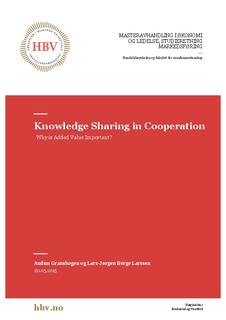| dc.description.abstract | In this thesis, we have used a literature review of extant literature to identify variables that affect knowledge sharing between companies in cooperation. We identified three possible antecedents of knowledge sharing that we examined in the thesis; trust, relationship commitment and interdependence. According to our literature review there are no documented affect between relationship commitment and knowledge sharing, and interdependence and knowledge sharing. Therefore we decided to conduct both a qualitative data collection, with an interview, and a quantitative data collection with an experiment.
In terms of the first data collection, the interviews, we where very fortunate and got the opportunity to interview key informants from both Kongsberg Maritime AS and Toyota Norge AS. The data we collected from the interviews was essential to the progress of the rest of the study. The findings from the interviews provided us with an in-depth knowledge of knowledge sharing in a practical situation. In addition, we identified a new construct called added value that, according to the interviewees, was an important antecedent of knowledge sharing and trust. These findings created the base for the development of the experiment that we conducted after the interviews. Also, the findings from the interviews implied that there were no connections between interdependence and knowledge sharing, thus we decided to remove it from the conceptual model. Instead we continued the research with added value, trust, relationship commitment and knowledge sharing.
The purpose of the experiment was to manipulate different levels of added value, and measure the effect on knowledge sharing. The experiment was performed on Norwegian students. The results from the experiment implied a significant connection between added value and trust, and added value and relationship commitment. The measurement of added values affect on knowledge sharing did not give a significant results, however the results from the knowledge sharing exercise in the experiment implied the opposite results. Thus, the relationship between added value and knowledge sharing was only partially supported in the experiment. Nevertheless, the interviews implied strong evidence towards a relationship between added value and knowledge sharing, therefore we believe that it is an important construct to investigate further. | nb_NO |
